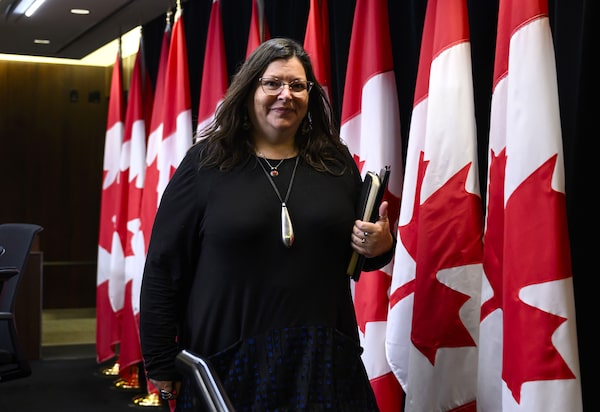
Federal Housing Advocate Marie-Josée Houle says encampments are not a safe or sustainable solution for housing and calls on Ottawa to address crisis.Justin Tang/The Canadian Press
The federal government must develop a national plan in the face of homeless encampments across Canada that amount to a human-rights crisis, the country’s first housing advocate said Tuesday.
In a report, Marie-Josée Houle said encampments are not a safe or sustainable solution for housing and individuals living under such circumstances face risks that include accessing water, food and sanitation.
Ms. Houle is calling on Ottawa to establish a national action plan by Aug. 31. Such a plan must prioritize offering people permanent housing as quickly as possible and address the root causes of encampments. Canada can solve this crisis, she added.
The federal housing advocate’s mandate includes acting as a non-partisan watchdog to push action to address housing needs and homelessness in Canada.
There has been a significant rise in encampments in the past five years, particularly since the COVID-19 pandemic, according to Ms. Houle’s report. They are now being reported in both large and small municipalities, as well as in more rural areas, with a growing number of people living in tents or informal shelters because of a lack of affordable housing, limited support services and nowhere safe to go.
“Encampments represent an effort by people who are unhoused to claim their human right to housing and meet their most basic needs for shelter,” the report said. “Encampments are often people’s only housing option, or the only option that meets their needs for safety, security and dignity.”
Unhoused people in Nova Scotia, Alberta, Saskatchewan and New Brunswick have died in camps, some from overdoses and tent fires.
Ms. Houle said that each day is a matter of life and death for individuals living in encampments.
“This national crisis calls for a national response,” she said.
Stephen Wilsack, an encampment volunteer who’s been sleeping rough to support unhoused people outside city hall in downtown Halifax, said that the report calls for what many, including him, have been advocating for months: that all levels of government need to come together and treat tent encampments like 9-1-1 emergencies of national proportions, providing basic necessities, such as heating, clean water, sanitation and food.
Halifax to dismantle several homeless encampments
“It’s everything that we’ve been saying and more,” he said. “The writing is on the wall.”
Police in Edmonton recently tore down eight homeless encampments deemed by the city to be “high risk,” arresting three people, including a journalist, at one of them.
In response to Ms. Houle’s report, Housing Minister Sean Fraser said the federal government is working on a plan to address the housing crisis more broadly, including efforts to support Canadians with intense needs, such as those who don’t have a place to live or who are precariously housed.
Mr. Fraser said that there is work to do to identify the right policy approaches and he said there are unique solutions that exist in different communities.
Ms. Houle’s report details how encampments are the product of a systemic failure to uphold the right to adequate housing. All governments must urgently prioritize spending on adequate housing and support services to prevent and address homelessness, the report said.
It also calls for an end to forced evictions of encampments, adding that this makes people more unsafe and exposes them to a greater risk of harm and violence.
The report also highlights how police and bylaw officers have responded to encampments. “Police, bylaw enforcement and emergency service need clear direction to halt the confiscation of belongings, surveillance and harassment, which violate the human rights of encampment residents,” it said.
Last week, residents living in a tent encampment in downtown Halifax awoke to find eviction notices from the city zip tied to the cables of their red ice-fishing tents – a decision Mr. Wilsack said has thrown local encampment communities into chaos. The 25 people currently living there have less than two weeks to move out of the public square.
“They do not earn enough money to pay for an apartment. We have residents that want to go into treatment facilities today, and there’s none available. And there’s individuals here that require mental-health help and all they have is a 1-800 number to call,” Mr. Wilsack said.
“The problem is not the unhoused. The problem is everything that has transpired here in the past number of years,” he said, referring to the affordability and housing crisis in Halifax and across the country.
“And this is like a volcano and all the lava is pouring out. We’re going to see more lava every day.”
The release of Ms. Houle’s report coincided with the start of the Union of B.C. Municipalities’ 2024 housing summit in Vancouver, which included a session on local governments’ concerns with homeless encampments.
Last November, the B.C. government introduced Bill 45 which, if passed, would require that municipalities prove alternative shelter is “reasonably available” before they can seek an injunction to remove an encampment. The shelter must meet the basic needs of the encampment residents by offering overnight shelter, access to a bathroom or shower, one free meal and staffing.
In Tuesday’s session, representatives from several B.C. municipalities pointed out additional challenges of the proposed change.
Kelowna Mayor Tom Dyas said even when his community has adequate shelter spaces for its estimated 250 unhoused residents, it is sometimes unable to staff those spaces owing to service providers expressing safety concerns because of untreated mental illness and addictions issues.
With a report from Andrea Woo and The Canadian Press